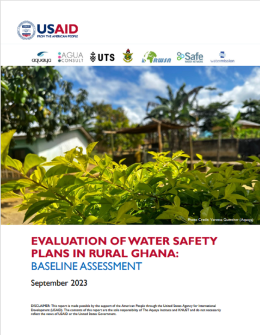RWSN Library

Author
REAL-Water
Year of Publishing
2023
Publisher
United States Agency for International Development (USAID) Rural Evidence and Learning for Water Project
Institution
Evaluation of Water Safety Plans in Rural Ghana
Baseline Assessment
Description:
Much of the global population is exposed to contaminated drinking water. In piped systems, contamination can be mitigated at the water supplier or household levels, but it is often easier to mitigate at the water supplier level where it can be centrally managed. A water safety plan (WSP) is a holistic tool for proactively ensuring the safety of drinking water supplies from source to tap. WSPs are at the early stages of implementation in Ghana, and an evaluation of their implementation approaches and impact would help guide nationwide adoption and provide evidence useful to water service providers.
This study from USAID’s Rural Evidence and Learning for Water (REAL-Water) includes 92 piped water supply systems operated by a non-profit, private water supplier in Ghana. The water systems are located across nine regions in southern Ghana, primarily in rural towns ranging in size from approximately 1,000 to over 10,000 people.
REAL-Water designed a randomized controlled trial to test the implementation effectiveness and outcomes of WSPs. This report presents the results of baseline data collection to understand the existing conditions of the water systems and communities prior to implementing WSPs. It discusses preliminary implications for water safety planning in rural, low-income settings.
Bibliographical Information:
REAL-Water (2023) Evaluation of Water Safety Plans in Rural Ghana. Baseline Assessment , United States Agency for International Development (USAID) Rural Evidence and Learning for Water Project
More Information
DOWNLOADS (6)
Evaluation of Water Safety Plans in Rural Ghana
 Google Übersetzer
Google Übersetzer
